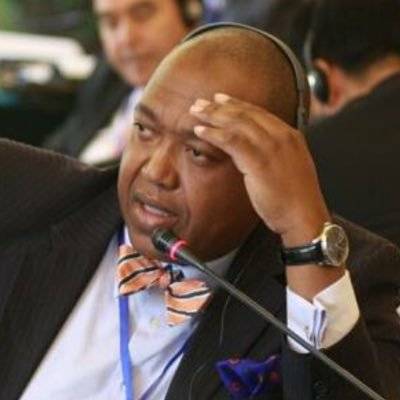The much-anticipated 2018 FIFA World Cup kicked off in Moscow on 14 June. There was low-key advance hype about this tournament for obvious reasons, not least because Russia has been at loggerheads with most western states where powerful global media organisations are based. Furthermore, the awarding of the tournament to Russia was linked to the controversial former President of FIFA, Sepp Blatter, whose push for Russia to host the tournament was challenged by, particularly, the British, whose 2018 hosting bid was defeated by Moscow’s. What also affected the publicity for this World Cup was Russia’s annexation of Crimea in Ukraine. Russia was expelled from the G8 after that controversial move led to anti-Russia sentiments in Europe.
Nevertheless, the de facto leader of Saudi Arabia, Crown Prince Mohammad Bin Salman, and Russian President Vladimir Putin were in the packed stadium in Moscow for the opening match between Russia and Saudi Arabia, something which generated much public commentary in the Middle East. Most of this consisted of celebrations after Saudi’s humiliating 0-5 loss to the host nation. This was not unexpected as Saudi Arabia’s record in the tournament is not impressive. This is its fifth world cup since its debut in the World Cup finals in 1994, during which the Saudi team has only won 2 of its 14 matches. In 2008, it lost 0-8 to Germany in South Korea. Some joked at the time that the Saudis are used by other teams to warm up before serious matches.
However, the celebrations at Saudi’s loss had less to do with the country’s football abilities than its recent regional politics. Bin Salman’s recent utterances on Palestine — “Palestinians must accept peace with Israel or shut up,” for example — and blockade of Qatar have had major consequences in terms of adding to anti-Saudi sentiments in the Middle East.
Matters got even worse after reports emerged late on Wednesday that Saudi Arabia and other Arab countries had voted against Morocco’s bid to host the 2026 FIFA World Cup. According to the Arab Weekly, “Moroccans were in a state of shock and betrayal” after Saudi Arabia, Iraq, Kuwait, Jordan, Bahrain, Lebanon and the United Arab Emirates supported the winning US-Canada-Mexico joint bid. It is not the first time that the Arab countries have “ganged-up against their own” at an international level. In October last year, Arab countries led by Egypt and Saudi Arabia waged a campaign against former Qatari diplomat Dr Hamad Bin Abdulaziz Al-Kuwari in his attempt to head the UN Educational, Scientific and Cultural Organisation (UNESCO). Kuwari lost narrowly to former French Culture Minister Audrey Azoulay.
Saudi Arabia’s football woes seem far from over as it gets set to play against tough opponents within Group A in the coming days, facing Egypt and Uruguay on Wednesday and Monday respectively. What will most likely vex the Saudis even more as the tournament progresses, though, is Qatar Airways’ sponsorship of the tournament. The electronic advertising hoardings around the pitches beam out “Qatar Airways” throughout each and every match, providing impressive publicity for the airline and, indirectly, the State of Qatar itself.
With Saudi Arabia and Qatar at loggerheads since Riyadh, Abu Dhabi and Cairo imposed a land, air and sea blockade against Qatar in June last year, it now looks like the UAE missed an opportunity when Emirates airline, which used to sponsor the FIFA World Cup, decided in 2014 not to renew its sponsorship deal. According to the Washington Post, Emirates dropped its deal with FIFA after corruption allegations surfaced that questioned the football governing body’s decision to award the 2018 and 2022 World Cups to Russia and Qatar respectively. Emirates was not alone; a number of other major sponsors also protested against Blatter’s alleged corruption.
It was in May last year that Qatar Airways announced that “it is to become an Official Partner of FIFA” and pointed out that it will have “extensive marketing and branding rights at the next two FIFA World Cups, with an expected audience reach of more than two billion people per tournament.” The airline will also have also have a major visible presence at competitions such as the FIFA Under-20 World Cup, the FIFA Futsal World Cup and the FIFA Interactive World Cup, the world’s largest online gaming tournament.
The State of Qatar and Qatar Airways are thus basking in the football spotlight whilst the talk about Saudi Arabia and its failures will continue to dominate discussions wherever Middle East football fans gather to watch the matches. Forget Saudi Arabia versus Russia, Egypt and Uruguay; the main contest is between Saudi Arabia and Qatar, and it looks clear who the winner is going to be.
https://www.youtube.com/watch?v=4iIooxxJ4wI
The views expressed in this article belong to the author and do not necessarily reflect the editorial policy of Middle East Monitor.

![Footballers seen during the opening match of the FIFA World Cup 2018 on June 14, 2018 [@QatarAirways / Twitter]](https://i0.wp.com/www.middleeastmonitor.com/wp-content/uploads/2018/06/Dfq_cpdXcAchsS_.jpg?fit=920%2C612&ssl=1)







